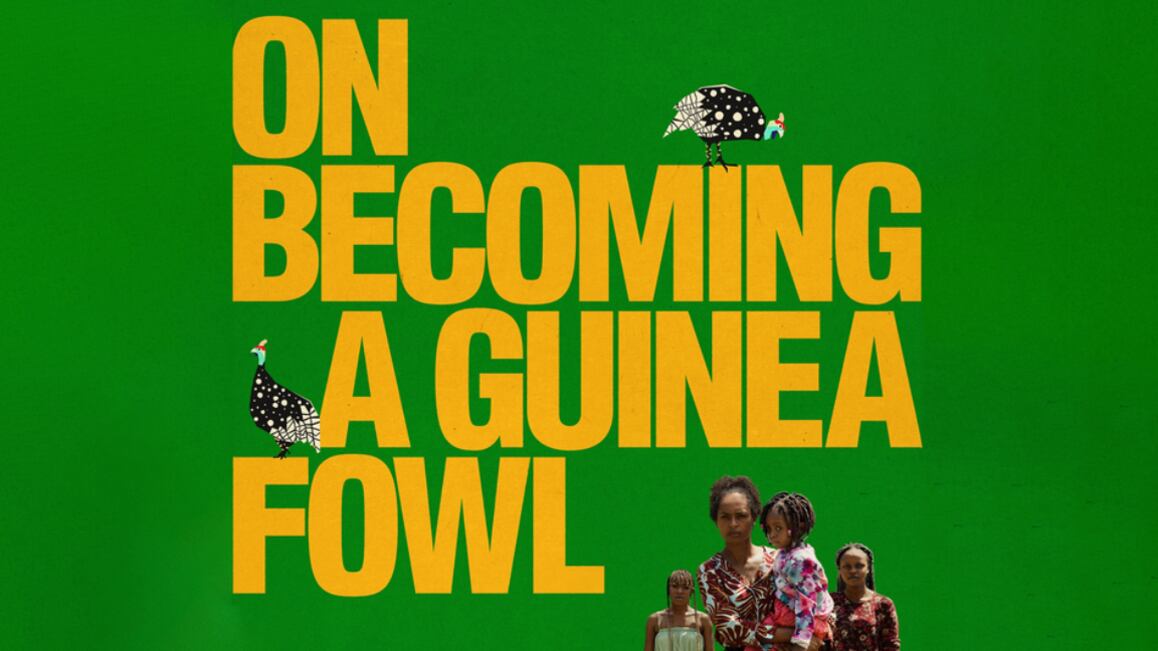For it being the work of just a second-time feature film director, Rungano Nyoni’s “On Becoming a Guinea Fowl” has a supremely confident opening sequence.
As the film begins, our protagonist Shula (Susan Chardy) is driving home alone from a costume party when she stumbles across a body lying in the road. She calls her father (Henry B.J. Phiri), who amusingly doesn’t recognize her number because Shula has acquired a new SIM card for her return to Zambia. In that conversation with her dad, Shula reveals to the audience that the body belongs to her Uncle Fred.
It’s a shocking realization for the audience, yet Shula seems entirely unperturbed. In fact, while waiting in her car for her father to show up and solve the situation (spoiler: he doesn’t), the sudden appearance of her intoxicated cousin Nsansa (Elizabeth Chisela), interrupting the episode of the “Diary of a CEO” podcast Shula was listening to—a clever and insightful character touch in and of itself—bothers her much more. Nsansa goes one step further than Shula and opts to call the police, but the only emotional reaction to Fred’s death she can summon is to laugh at how close he died to the local brothel.
Nyoni, who also wrote the film, which hit theaters on March 7, purposefully constructs this introduction to be off-putting, but not without well-considered reason. As “On Becoming a Guinea Fowl” progresses with the mourning and funeral rituals in keeping with Fred’s death, we learn that Fred has skeletons in his closet that Shula and Nsansa’s parents either ignore or choose not to acknowledge. It makes for a compelling and harrowing family drama that sees Shula and her cousins confront their family’s imperfections and the potentially problematic nature of adhering to tradition.
The film excels in the subtlety of its character work. Nyoni has the self-assurance as a filmmaker to truly show the audience how Shula has become disconnected from her community without needing any expository dialogue. In an early attempt to try and escape the all-encompassing mourning process, Shula decamps to a hotel, needing to hop on Zoom calls for her seemingly UK-based job, where she’s lived away from her Zambian hometown. But we quickly understand how overwhelming her family can be when multiple aunties show up to Shula’s hotel room, excoriate her for having a shower (bathing is not permitted in a mourning period) and command that she forgoes the duties of her job to immediately pick her mother up from the airport.
There are so many details in that scene that the audience doesn’t definitively know: what her aunties’ names are, what each one’s relation to Shula is or what she does for a living that requires her to hop on a Zoom from Zambia. Yet, Nyoni knows that none of those things really matter as long as we understand Shula’s suppressed frustration with her familial circumstances.
That scene also offers us somewhat of a roadmap for how to come to grips with “On Becoming a Guinea Fowl.” An ensemble of characters have speaking lines, many with names we’ll never know, but we must simply allow ourselves to sink into Nyoni’s darkly poetic tenor and trust that we’re in the hands of someone who knows what they’re doing. In a later scene, Shula and Nsansa go to collect their cousin who attends a nearby university, and the filmmakers convey a deep dread that has a distinctly realistic and barebones feel, working with just the essential elements of cinema: talented actors, natural lighting and a well-chosen location.
But for all the film’s starkness, Nyoni manages to infuse some whimsy and even magical realism. We frequently cut to a children’s television show about the actual guinea fowl bird, which Nyoni uses to expand on her theme of childhood innocence in characteristically clever fashion. We also have moments where Shula exists in the same frame as a younger Shula, giving the otherwise grounded film a briefly surreal aura. In another film, this would make for an unnecessary or self-indulgent risk, but Nyoni employs this device so judiciously that it leaves us haunted to the core by the end—if we weren’t already.
Nyoni’s first name — Rungano — means “storyteller” in the Shona language, which seems to have truly become a case of nominative determinism. She possesses a remarkably lean writing and filmmaking style that uniquely suits the style of family drama in “On Becoming a Guinea Fowl” and leaves a deep impact long after the credits have rolled.
